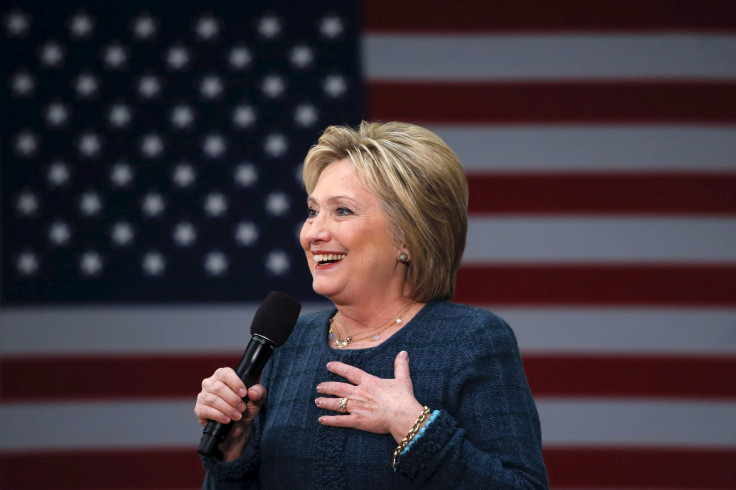Hillary Clinton Alleged Barack Obama Sold Access To Big Donors; Now Criticizes Campaign Finance Attacks

In the closing stretch of the New Hampshire primary campaign, Hillary Clinton has slammed critics for pointing out that she backed public policies that helped her major campaign contributors in the financial industry. At a debate sponsored by MSNBC, she said it was out of line for her opponent, Vermont Sen. Bernie Sanders, to “link donations to my political campaign, or really donations to anyone’s political campaign, with undue influence with changing people’s views and votes.”
“But time and time again, by innuendo, by insinuation, there is this attack that he is putting forth, which really comes down to — you know, anybody who ever took donations or speaking fees from any interest group has to be bought,” Clinton said. She dismissed such suggestions as a “very artful smear” of public officials that is unacceptable in American politics.
In her previous presidential campaign, though, Clinton launched an aggressive attack on then-Illinois Sen. Barack Obama over campaign finance issues. She explicitly alleged that Obama traded access and legislative deals for campaign cash in a set of public attacks, one of which was criticized as deeply dishonest.
Today Clinton presents herself as an unwavering ally of Obama — and has accused Sanders of indirectly besmirching the president with his criticism of politicians who take Wall Street donations. But in April 2008, Clinton’s campaign aired a television ad portraying Obama’s support for a 2005 energy bill as a quid pro quo for campaign donations. The ad said Obama had “accepted $200,000 from executives and employees of oil companies,” while criticizing him for voting “for the Bush-Cheney energy bill that that put $6 billion in the pocket of big oil.” The clear message: Obama backed the bill as a favor to donors.
Clinton also accused Obama of exchanging legislative favors for campaign cash from the nuclear industry.
"Sen. Obama has some questions to answer about his dealings with one of his largest contributors — Exelon, a big nuclear power company,” she declared. “Apparently he cut some deals behind closed doors to protect them from full disclosure of the nuclear industry.”
In its review at the time, the Washington Post gave Clinton’s attack “two Pinocchios” for dishonesty, saying the campaign “failed to provide evidence to support the New York senator's claim of a secret deal between Obama and the nuclear power plant operator ‘to protect them from full disclosure.’”
Clinton’s apparent change of heart about the propriety of campaign finance criticism comes as Sanders is trying to focus the race on the role of money in politics. That effort plays off a series of reports documenting the former secretary of state’s support for policies benefiting industries that delivered big money to her campaigns and her family’s foundations. Among them:
• A Wall Street Journal report on the secretary of state helping a major bank that donated to the Clinton Foundation.
• A New York Times report on Clinton supporting a uranium deal that helped a Clinton Foundation donor.
• International Business Times reports on Clinton backing arms deals, approving contracts, pushing trade deals and supporting offshore drilling legislation that helped major foundation and campaign donors.
• An analysis by Elizabeth Warren suggesting Clinton backed a bankruptcy bill to help her campaign donors in the financial industry.
• A report by the Intercept on Clinton reversing her support for single-payer healthcare after being paid $2.8 million in speaking fees from the healthcare industry.
With two new national polls showing Sanders pulling even with the former secretary of state among Democratic voters, the Clinton campaign has deployed Bill Clinton to portray the Vermont lawmaker as a hypocrite for raising the donation issue. In a speech Sunday, the former president said a CNN report showing that Sanders joined other Senate Democrats at the party’s annual donor events undercuts Sanders’ debate comments about the influence of money in politics. “He may have to tweak that answer a little bit — either that or we're gonna have to get us a write-in candidate,” he said.
The attempt to flip the campaign finance issue back on Sanders, though, spotlights an inherent contradiction in Hillary Clinton’s arguments. At times, like in last week’s debate, Clinton has disputed the idea that campaign donations and speaking fees buy influence. Yet in her campaign launch speech last summer, Clinton asserted that money was a problematic influence on public officials. “We have to stop the endless flow of secret, unaccountable money that is distorting our elections, corrupting our political process and drowning out the voices of our people,” she said.
When Clinton later rolled out a plan to reform the campaign finance system, her campaign said in an email to reporters that the proposed changes were necessary to end “the stranglehold that wealthy interests have over our political system.”
In October, an email sent by the Clinton campaign accused GOP presidential hopefuls of “fighting” on behalf of “the people already at the top — the big banks, the billionaire donors and corporations, for the top 1 percent of America.” An email her campaign sent the next month asserted that the Republican candidates were pushing for “tax cuts that would benefit their wealthiest donors while doing far too little for the middle class.”
© Copyright IBTimes 2024. All rights reserved.












